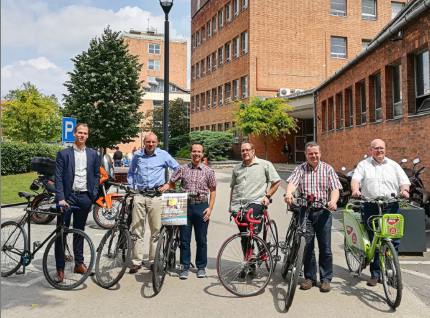Workplace Mobility Plan for Budapest University of Tehnology and Economics (Hungary)
Budapest (Hungary), 4. December 2018
Next plan for presentation is Workplace mobility (WMP) plan for BME Faculty of Transportation Engineering and Vehicle Engineering (BME KJK).
Here is the summary from Workplace Mobility Plan for BME KJK:
The aim of MOVECIT project is to increase share of sustainable modes in workplace commuting. Budapest
University of Technology and Economics (hereafter BME) carried out the following Workplace Mobility Plan
(WMP) for BME Faculty of Transportation Engineering and Vehicle Engineering (BME KJK).
Planning the WMP, the first step was to examine the commuting habits and demands of the workers. For
this, an online survey was sent out, and 57 responses arrived from the 210 workers. Whereas most of the
workers are more interested in mobility and transportation, filling the survey was still able to raise
awareness of mobility habits. As a result of the survey, we identified that modal share of bike is better
than the urban average, although, car and public transport shares are worse. Partly with raising
consciousness, partly with developing infrastructure, the share of sustainable modes can be improved.
Less than the half of the respondents came from the functional urban area. The share of the bikers, who
commutes between 10 and 20 km a day is 10%. This is a satisfactory number, and a good example of the
trends which show the extended commuting distances by bike. For them, new cloak rooms and showers
are suggested to be developed. Since the university’s work schedules are very flexible, car-pooling is not a
good solution for the majority.
A detailed site visit was held to examine the quality and suitability of the facilities. Although there is a
theoretical opportunity for showering, the current solution is inappropriate for the demand and no one
uses it one a daily basis. However, the bike storages are reported to be easy to use.
With the participation of dedicated employees of BME KJK, the Mobility Team was established during
planning the workplace mobility. The mobility team will have the deputy economic dean, the building
manager responsible for the chancellery and volunteer colleagues.
For further spread of sustainable transport modes during commuting, we propose nine measures. The first
measure will be purchasing electric rollers, because the execution of trips within campus is problematic
due to the long distances between the university building. Having electric rollers helps commuters from
the functional urban areas, as the employees may use these tools to take them home and come to work.
Using this sustainable transportation mode would definitely lower CO2 emission. Four other measures will
help cycling, for example with bike-sharing passes, a better executed shower development and lobbying
for a better and safer cycling network around campus. A long-term development is also planned: shuttle
bus services in and around campus with self-driving vehicles. This idea on the one hand requires a lot of
innovation and has a lot of barriers. On the other hand, reflects well to a main problem of the campus:
the public transport stops are relatively far away from the buildings. This provides an explanation, why
the current number of car users is relatively high. Another long term aim is to develop ideas for parking
management, such as time based tickets, reservation systems and incentives for specific user groups. Thus
introducing some parking management policies and new fleets of sustainable transportation modes would
decrease the number of car users and support the aims of CO2 reduction and healthy lifestyle.
Workplace Mobility Plan you can find here.

